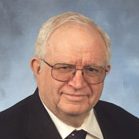In Memoriam: Fred Burwick

Fred Burwick, an internationally-recognized authority on Romantic-Era British Literature, and the author and editor of over 30 books, including recently A History of Romantic Literature (published in 2019), died one day before his 86th birthday in Pomona on March 16, 2022 after suffering an abdominal aneurysm.
“Fred defined indefatigability. He simply seemed to know everything,” said Adam Komisaruk of West Virginia University. “But he wore his immense learning as comfortably as his blue blazers, never stinting in his generosity. He modeled the art of communicating complexity in clear and unpretentious terms, accompanied by an impish laugh.”
“Fred was a good soul and a good citizen who lived his values. He was kind and encouraging, and always interested in sharing his learning and learning from others,” commented Susan Wolfson, Professor of English at Princeton University and former President of the Association of Literary Scholars, Critics and Writers.
Richard C. Sha of American University said, “He was such a genial, consistently generous and encouraging colleague. Especially, he was good at building bridges between scholars on different sides of the Atlantic—and globally.”
“I doubt I will ever meet another person with such an encyclopedic mind, yet such a humane and gregarious and empathetic soul,” said Noah Comet, one of Professor Burwick’s former students now on the faculty of the U.S. Naval Academy.
Other former students of Professor Burwick voiced their sense of gratitude: “Fred has been for us a mentor, colleague, and most of all friend whom we will greatly miss,” said Professor Benjamin Colbert of the University of Wolverhampton, England.
Julian Knox of Georgia College added, “He made me who I am as a scholar and teacher.”
Professor Burwick was born Fred Lorrain Burwick on March 17, 1936 in Pomona, California. After earning a BA at the University of La Verne, he attended Cal State LA before completing doctoral studies in English Literature at the University of Wisconsin, Madison, in 1965. He immediately took up a position at UCLA and embarked on a highly successful career as a teacher and scholar.
He was a warm and enthusiastic presence at UCLA, and became famous as a Residential Advisor in Hedrick Hall, where he persuaded students to stage productions of Romantic-era plays in the dorm, and earned the nickname “Frederick of Hedrick.”
“Fred Burwick was an esteemed colleague, devoted teacher and mentor of graduate students, and extraordinarily productive scholar. We at UCLA will miss him greatly,” said Anne K. Mellor, Distinguished Research Professor of English.
During his years on the UCLA faculty, Professor Burwick taught in visiting positions in Germany at the universities of Würzburg, Siegen, Göttingen, and Bamberg. He was also invited to lecture at Cologne, Heidelberg, Leipzig, and Munich, as well as Oxford and Cambridge Universities in England.
An avid promoter of undergraduate and graduate educational programs, he spent two years (from 1992 to 1994) as the Director of the UC Education Abroad Program at the University of Göttingen. He was widely recognized for generosity to his students and colleagues, unfailingly willing to go the extra mile to help them in any way he could.
He was virtually a fixture at the summer Wordsworth Conference in Grasmere, England, where scholars and students gathered to celebrate the life and works of British Romantic writers like William Wordsworth and Samuel Taylor Coleridge.
One of the regular attendees, Professor Drummond Bone, former Master of Balliol College, Oxford, said, “Fred was one of my heroes from the Wordsworth Summer Conference. He was just intellectually so astute!”
Larry H. Peer, President of the International Conference on Romanticism, added, “Fred was known for his ebullient sense of humor and his ever-present helpfulness to colleagues and students in their endeavors. He almost never missed an annual meeting of the ICR, and was regularly present around the world at scholarly gatherings.”
For many years, he was taking a group of Alumni on trips to Europe, lecturing on sites and their histories that were important to him.
With an interdisciplinary approach to literature, Dr. Burwick developed and taught over thirty different courses at UCLA exploring English and German literature in relation to art, science, music, and theater. His courses were filled with challenges and surprises, with titles like “Vampire and Reader,” “The Grotesque,” and “The Dream in English and German Romanticism.”
In addition to his many books, he published over one hundred fifty articles and reviews. He was well-known for his work on Samuel Taylor Coleridge, the author of “Rime of the Ancient Mariner,” and he also edited four of the twenty-one volumes of the works of Thomas De Quincy, author of “Confessions of an Opium Eater.”
His books spanned a wide range, from Illusion and the Drama to a book on the Marquis de Sade and a reference work listing “Keywords” for the study of Romantic Literature. In latter years, he published several books on the London Theater, including Playing to the Crowd: London Popular Theatre, 1780-1830.
His love of theater led him to organize the performance of over a dozen plays, like Oscar Wilde’s “The Importance of Being Earnest,” and Hannah Cowley’s 1783 comedy, “A Bold Stroke for a Husband.”
Although he was an enormously productive writer, he was also an active editor, serving as a principal official and often Chief Editor for scholarly journals throughout his career, including the European Romantic Review and Pacific Coast Philology.
Professor Burwick received many awards and fellowships in his career. He was named Distinguished Scholar by the British Academy in 1992 and the Keats-Shelley Association in 1998. His book on Poetic Madness and the Romantic Imagination won the Outstanding Book of the Year Award of the American Conference on Romanticism. He is also a recipient of an Andrew W. Mellon Foundation Emeritus Fellowship and a distinguished Alumni Award from his alma mater, La Verne University.
He is survived by his wife, Roswitha, sons Georg, Christopher and Francis, and eleven grandchildren. The family will conduct a private burial service.